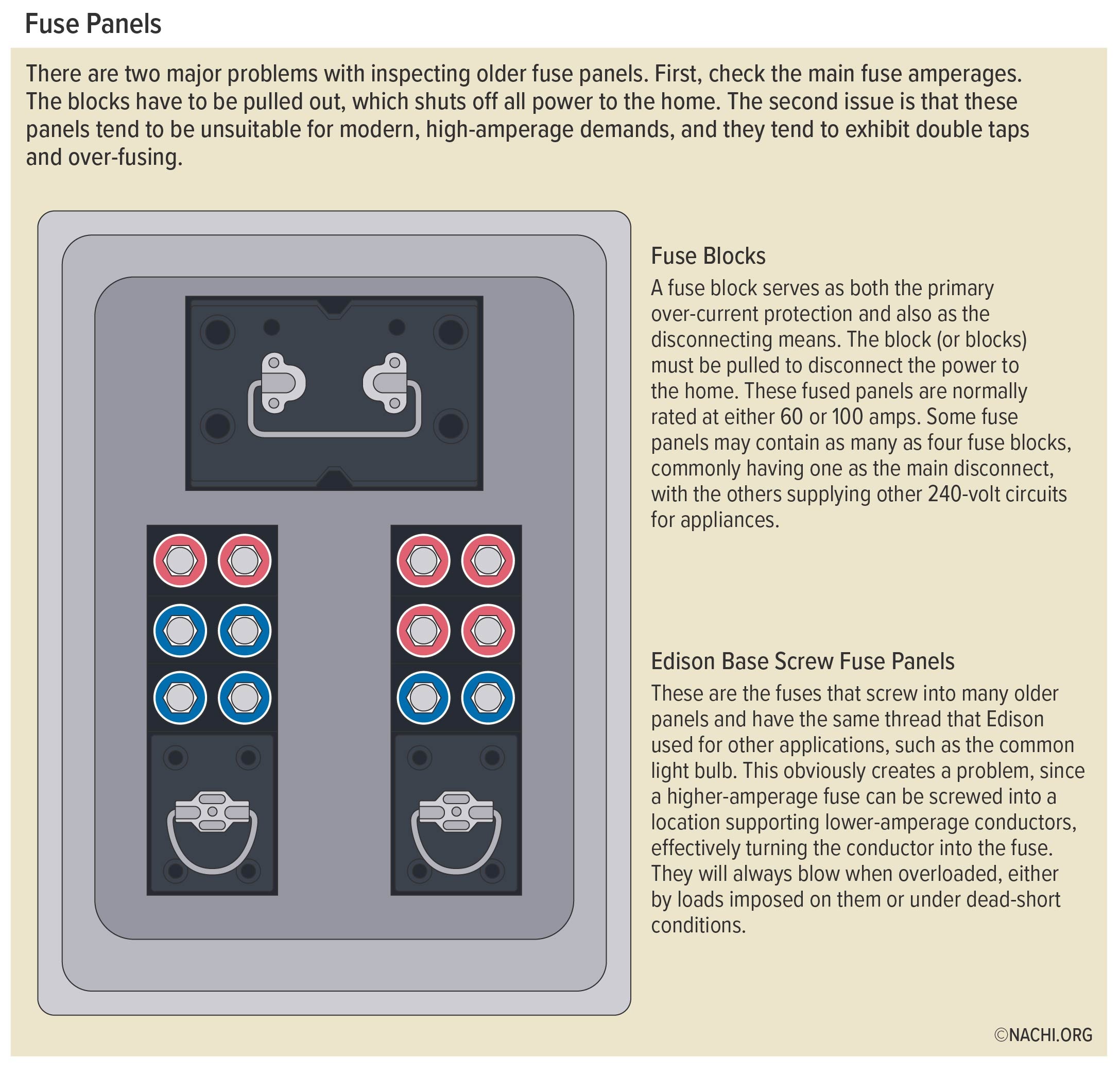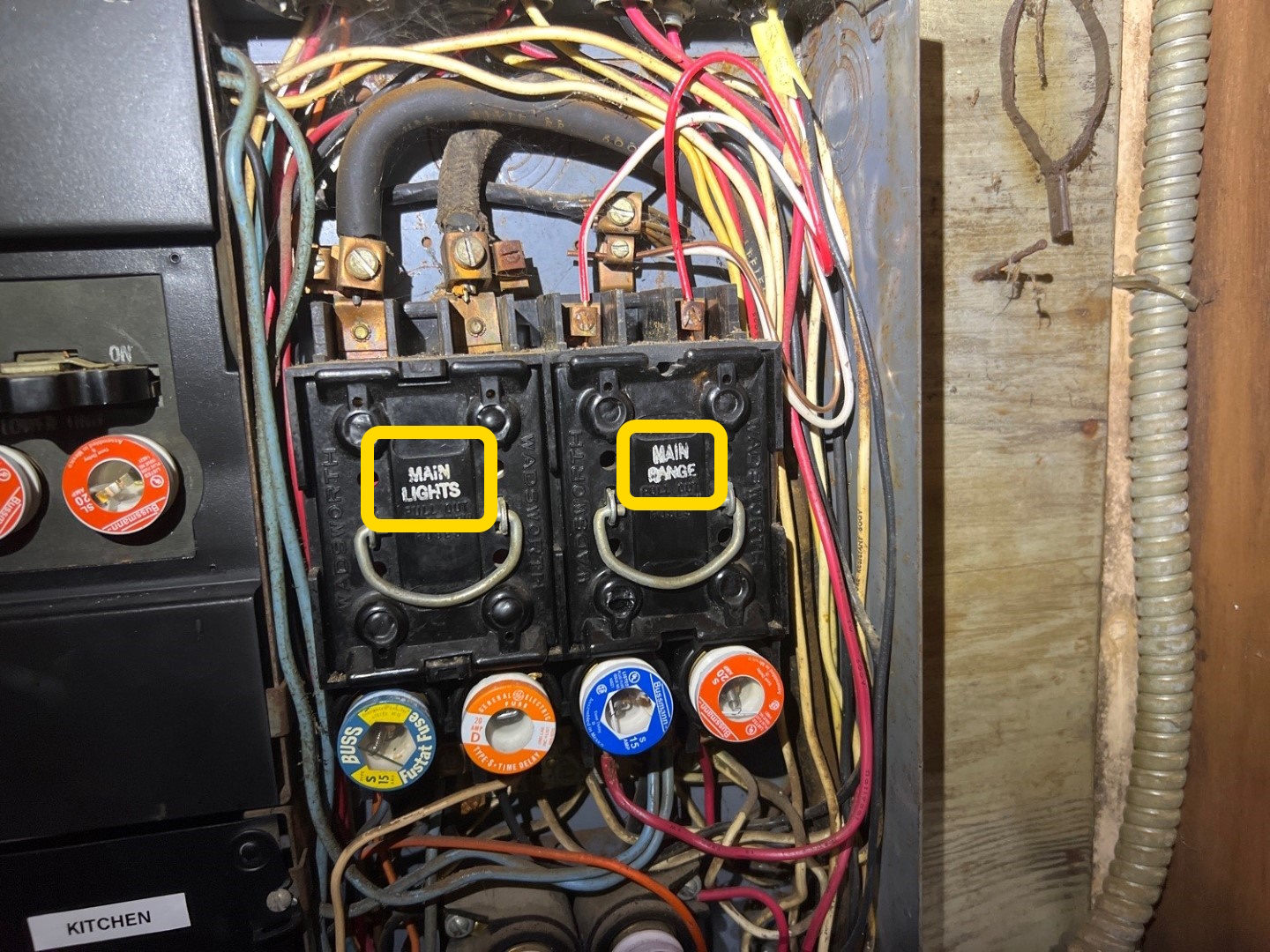First Class Info About Are Fuse Panels Still Legal

Looking At Buying A New Place. This Fuse Panel Is In The Garage,
Fuse Panels
1. Understanding the Basics
Let's talk fuse panels. You know, those gray boxes lurking in basements or closets, filled with little screw-in fuses that blow at the most inconvenient times? The question on everyone's mind, especially if you're dealing with one, is: "Are fuse panels still legal?" The answer, like most things in the electrical world, isn't a simple yes or no. Think of them like rotary dial phones — functional, but definitely showing their age.
Fuse panels are the dinosaurs of electrical safety. They were the go-to protection system for homes for decades, diligently guarding against overloads and short circuits. Each fuse is designed to break the circuit if the current exceeds a certain level, preventing potential fires. But technology has moved on, and so have electrical codes.
Here's where things get interesting. While you might still find fuse panels in older homes, electrical codes generally discourage their installation in new constructions or major renovations. The main reason? Circuit breakers offer a more reliable and convenient level of protection. Plus, finding the correct replacement fuses can sometimes feel like searching for a unicorn.
So, if you have a fuse panel, don't panic. It's not an automatic violation of any law. However, it's a good idea to understand its limitations and consider the benefits of upgrading to a circuit breaker panel, which is now the standard.

Wadsworth Electrical Fuse Panels Cheapest Outlet Www.oceanproperty.co.th
Fuse Panels vs. Circuit Breakers
2. We break down the difference
Think of fuse panels and circuit breakers as two different generations of safety equipment. Fuse panels rely on replaceable fuses that melt and break the circuit when overloaded. Circuit breakers, on the other hand, are reusable switches that trip and can be reset. In other words, one-time use versus a potentially long-lasting solution.
One of the biggest advantages of circuit breakers is their convenience. When a circuit breaker trips, you simply flip it back to the "on" position after addressing the cause of the overload. With fuse panels, you need to have replacement fuses on hand, and they have to be the exact right amperage. Using the wrong fuse can be dangerous and create a fire hazard.
Circuit breakers also offer better visibility. Most circuit breaker panels have clear labeling, making it easy to identify which circuit controls which area of your home. Fuse panels can sometimes have cryptic or faded labels, making it a guessing game to figure out which fuse goes where.
From a safety perspective, circuit breakers are generally considered more reliable. They are less prone to human error (like using the wrong fuse) and offer more consistent protection against overcurrents. In short, while fuse panels did their job well for their time, circuit breakers are simply the more modern and safer option.

Fuse Panels Inspection Gallery InterNACHI®
Legality
3. Navigating the Regulations
The legality of fuse panels often boils down to local electrical codes. These codes are designed to ensure the safety of electrical installations and are typically based on the National Electrical Code (NEC). While the NEC doesn't explicitly outlaw fuse panels in existing installations, it strongly favors circuit breakers for new construction and major upgrades.
Many local jurisdictions have adopted stricter regulations than the NEC, effectively phasing out fuse panels over time. When you are planning for any electrical work in your home, it's best to check your local building department, who can give you information about the prevailing code in your area. They can tell you if you will be required to upgrade to a circuit breaker panel during a renovation or electrical upgrade.
Even if your local codes don't require you to replace a fuse panel, it's a good idea to consider doing so for safety and convenience. A fuse panel in good condition is not, in itself, an immediate hazard. However, it represents an older standard of electrical protection, and upgrades offer significant safety benefits.
Ignoring safety codes can lead to serious problems, from voiding your homeowner's insurance to creating a dangerous fire hazard. Before doing any electrical work, consult a licensed electrician to ensure you're in compliance with all applicable codes and regulations. The long-term cost of safety is almost always less than that of an accident.

Fuse Box Vs Electrical Panel Understanding The Difference
When Should You Upgrade?
4. Recognizing the Signs
Even if "are fuse panels still legal" where you live, there are several situations where upgrading from a fuse panel to a circuit breaker panel is highly recommended. The most obvious reason is if your fuse panel is old, damaged, or malfunctioning. Signs of trouble include frequent blown fuses, flickering lights, or a burning smell coming from the panel.
Another key trigger is if you're planning a major home renovation or adding new electrical circuits. Modern appliances and electronics demand more power, and an outdated fuse panel may not be able to handle the increased load. Overloading a fuse panel is a surefire way to create a fire hazard.
Furthermore, if you're having trouble finding replacement fuses for your panel, it's a sign that it's time to upgrade. The availability of fuses is dwindling as circuit breakers become the standard, and you don't want to be stuck scrambling for obsolete parts when a fuse blows on a Saturday night.
Finally, consider upgrading if you're selling your home. A modern circuit breaker panel can be a selling point, as it provides peace of mind for potential buyers and shows that the electrical system is up to date. It's an investment that can pay off in terms of resale value and overall safety.

The Upgrade Process
5. Navigating the Upgrade
Upgrading a fuse panel to a circuit breaker panel is not a DIY project. It requires a licensed electrician and a permit from your local building department. The process typically involves disconnecting the power, removing the old fuse panel, installing the new circuit breaker panel, and wiring the circuits to the new breakers.
The electrician will also ensure that the new panel is properly grounded and that all wiring meets current code requirements. Depending on the size and complexity of your electrical system, the upgrade can take anywhere from a few hours to a full day. The main things is to hire an expert because electricity is not something to play with.
During the upgrade, you'll likely experience a temporary power outage. Your electrician should be able to give you an estimate of how long the power will be off and advise you on any necessary preparations, such as backing up your computer or turning off sensitive electronics.
While the upgrade may seem like an inconvenience, it's a crucial investment in the safety and reliability of your home's electrical system. A modern circuit breaker panel will provide better protection against overloads and short circuits, reduce the risk of electrical fires, and give you peace of mind knowing that your home is up to code. Plus, you'll never have to hunt down obscure fuses again!

Fuse Box Pluggedinelectric
FAQs
6. Addressing Common Concerns
Let's tackle some common questions that people have about fuse panels and circuit breakers:
Q: My fuse panel seems to be working fine. Do I really need to upgrade?
A: Even if your fuse panel is functioning, it's still an older technology that may not provide the same level of protection as a modern circuit breaker panel. Upgrading can improve safety and convenience, especially if you're planning any electrical upgrades or experiencing frequent blown fuses.
Q: How much does it cost to upgrade a fuse panel to a circuit breaker panel?
A: The cost of an upgrade can vary depending on the size of your electrical system, the complexity of the wiring, and your location. It's best to get quotes from several licensed electricians to get an accurate estimate. Be sure to ask for a breakdown of the costs, including materials, labor, and permit fees.
Q: Can I replace a fuse with a higher amperage fuse to stop it from blowing?
A: Absolutely not! This is extremely dangerous and can create a fire hazard. Fuses are designed to protect against overloads, and using a higher amperage fuse bypasses this protection. Always use the correct amperage fuse for your panel and circuit.